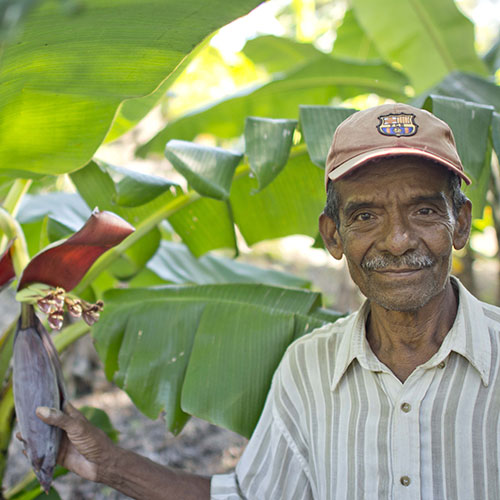Stories of Change

Felix, another farmer in the program, on his farm. Photo: Alex Morse / Foods Resource Bank
Led by Church World Service with local partner CIEETS, the Foods Resource Bank Nicaragua Mateare Carazo Program encompasses 8 communities, 220 households and 1,251 individuals.
Source: Foods Resource Bank
Faith and farming empower communities
This story was originally posted by our partner Foods Resource Bank.
Pastor Santiago is the spiritual and community leader of a place called Las Cabeceras. A farmer himself, he uses his influence with his deeply devout community to address water scarcity and prolonged drought and bring about real improvements in people’s lives. As he puts it, “We are all responsible for caring for Creation.”
Program communities are often cut off from the rest of the world by distance and impassable roads, so people depend on each other for their survival. Santiago is one of 20 active community organizers and promoters in the FRB food security program, and encourages neighbors affected by the three-year drought to find ways to become more resilient.
Santiago came to Las Cabeceras 15 years ago because of the good conditions for agriculture – fertile soils and plenty of rain. However, in the last six years, yields have been declining as result of the combination of very high temperatures and poor rain patterns, which in turn have resulted in severe economic losses.
Since Santiago joined the program, he’s better able to support his family economically with his “diversified farm,” growing maize, beans, sorghum, banana, cassava and more so that he still has food if one or more crops fail. Farmers are finding solutions to water scarcity, improving soils, protecting their watersheds, engaging in reforestation, and experimenting with a variety of climate-specific seeds and seed banks.
He says, “The hands-on Farmer Field Schools in the program are important because they allow us to come together and look for a solution to a common problem like the drought. We share our ideas and experiences and reinforce the need for everyone in the community to seek compromises and solutions.”
